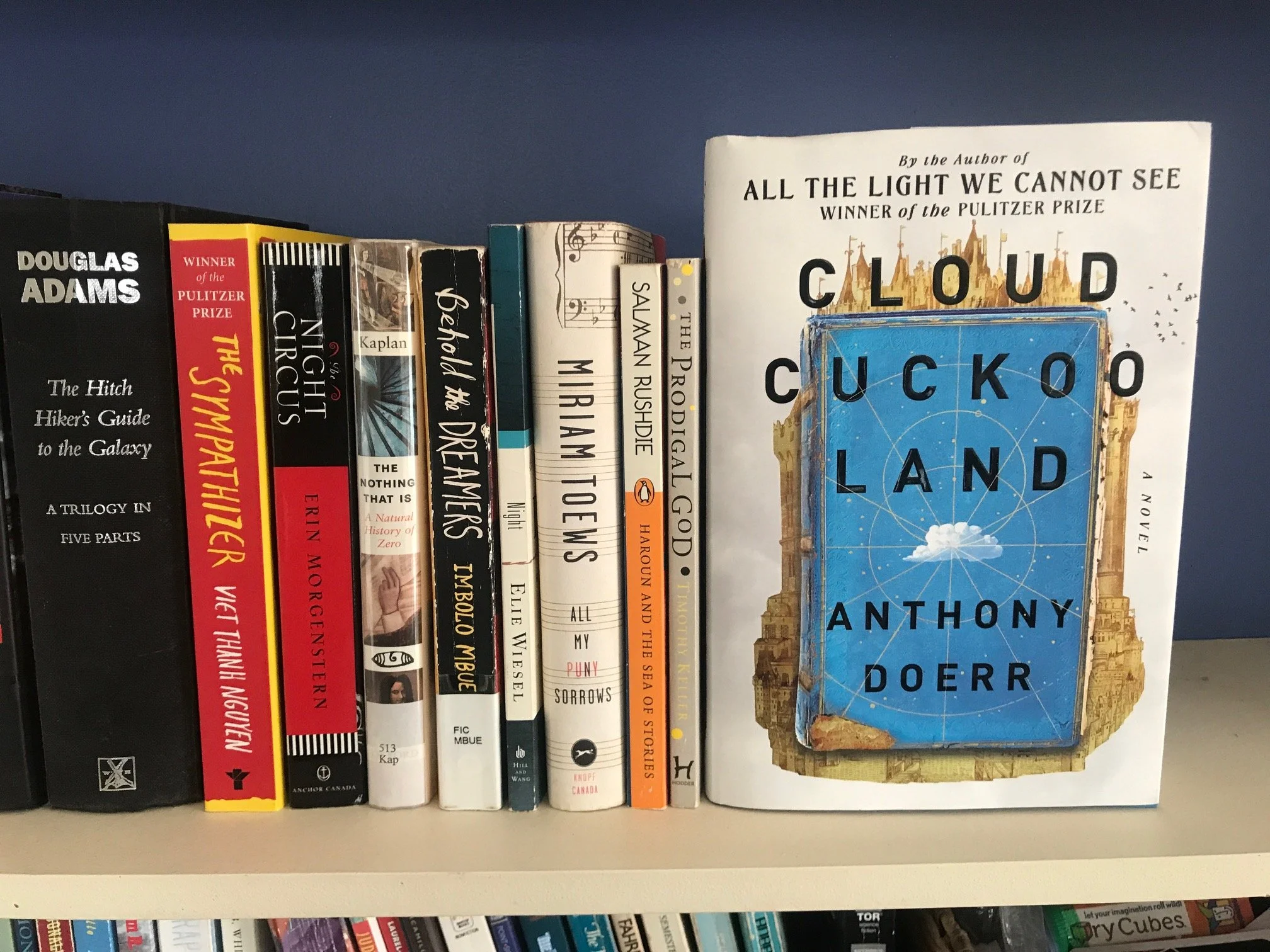The end of the world as we know it
“Each morning comes along and you assume it will be similar enough to the previous one – that you will be safe, that your family will be alive, that you will be together, that life will remain mostly as it was.”
That’s from Cloud Cuckoo Land, American author Anthony Doerr’s new book.
“Then a moment arrives and everything changes” (64).
photo from the author
In Cloud Cuckoo Land, the world ends roughly five times. This epic novel spans centuries, reaching not only back but forward in time. Characters in five different storylines live through the last days of everything they’ve known.
In 1452, a young girl pilfers through monastery graves to find manuscripts she can sell while Saracen troops lay siege to Constantinople. Outside the city, a peasant boy with a cleft palate has been forced to turn his oxen into tools of war.
In the 1960s, a young man takes the ghosts of his father’s war to Korea.
In 2020, a teenager brings a bomb into a library to get back at the developers who destroyed the habitat of his beloved Great Grey Owl.
And in 2146, a girl scratches words onto slips of repurposed paper in a sealed room on a spaceship heading to another planet. Earth has been abandoned; it dried up.
A single narrative thread ties these five people together: they all encounter the same Greek myth about a fool searching for an imaginary land – a paradise in the sky called Cloud Cuckoo Land. For some characters, Cloud Cuckoo Land is a distraction from hardship, a way to “slip the trap” of life for a little while. For some, the dream feels pointless, delusional. But for others, Cloud Cuckoo Land is a whisper in the night, promising something better just over the horizon.
The peace of God breaking through
This year of our Lord 2022 feels apocalyptic too. War in Eastern Europe and COVID never-ending. If the virus hasn’t directly impacted your health, it’s played havoc with everything else: jobs, relationships, supply chains. The walls of our security have been breached. Regular conversation is a minefield. In every direction, we see the tools of war.
Did it feel like that for Jesus’ disciples at Passover? Sometimes I wonder. Peter brought his sword to a prayer meeting. They were ready for revolution, not death on a cross. After Jesus was buried, they grieved in locked rooms, afraid they would be arrested next. It must have felt like the end times. It must have seemed like Jesus’ ministry was over.
Even hope, when it did come, was slow to break through.
Is the empty tomb a trap?
Did this gardener steal the body?
What are we going to do now – go fishing?
But then Jesus’ resurrected body appears – again and again. He shows up in the flesh, in person, to the disciples, and he blesses them with peace. He won the victory over death and celebrates with peace.
On Resurrection Sunday: “May each one of you be at peace.”
Eight days later, the time Thomas was there: “May each one of you be at peace.”
And then on the beach, after a night of fishing: “Follow me!”
It is the end of days, but not like anyone expected. God so loved this world that he sent his son to live here. To die here. And, by rising again, to save us, here.
It’s not really an ending that makes a lot of sense. But that’s because we’re still in the middle of the story – and called to help change it. Called to bring blessings of peace and to follow the ways of Jesus in apocalyptic times.
What does that look like? Maybe sponsoring refugees from Ukraine. Maybe wearing a mask, even when you don’t have to anymore. It looks like prayers lifting upward for everyone in pain, in fear, in suffering. It means extending grace to those whose supplies of grace have run short.
In Cloud Cuckoo Land, in between all the other narratives, a group of children is practicing a play. They’re in the same library as the bomber, on the second floor. They are enacting the story of the paradise-seeking fool – the same story (spoiler alert!) rescued from Constantinople, translated in a prisoner-of-war camp, published by a librarian and rediscovered in the future on a spaceship.
There’s no mention of COVID anywhere in Doerr’s book. But the children are practising above an actual bomb and the date in their timeline is February 2020 – that’s no coincidence. Time is ticking down for these kids: to an explosion, a pandemic, a world-wide drought.
Years later, however, when the bomber is on trial, he hears about how the children – while not unaware of the crisis downstairs that February 2020 day – chose to carry on regardless. They pulled together. They made some edits to the script that had always bothered them. And then here’s my absolute favourite line: “While he was downstairs with his bombs, the children were upstairs, rewriting their ending” (567).
That’s the good news that shows up on Resurrection Sunday in the shape of Jesus’ actual, physical body: God’s revised ending.
When all we can see are the tools of war, the peace of God is already breaking through.



